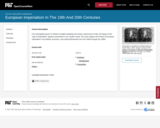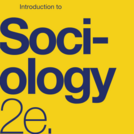
Access university-level course materials compiled for course on European imperialism.
- Subject:
- Social Studies
- Material Type:
- Full Course
- Provider:
- Massachusetts Institute of Technology
- Provider Set:
- OpenCourseWare
- Date Added:
- 08/07/2023

Access university-level course materials compiled for course on European imperialism.

Introduction to Sociology 2e adheres to the scope and sequence of a typical, one-semester introductory sociology course. It offers comprehensive coverage of core concepts, foundational scholars, and emerging theories, which are supported by a wealth of engaging learning materials. The textbook presents detailed section reviews with rich questions, discussions that help students apply their knowledge, and features that draw learners into the discipline in meaningful ways. The second edition retains the book’s conceptual organization, aligning to most courses, and has been significantly updated to reflect the latest research and provide examples most relevant to today’s students. In order to help instructors transition to the revised version, the 2e changes are described within the preface.


Understand types of economic systems and their historical development
Describe capitalism and socialism both in theory and in practice
Discussion how functionalists, conflict theorists, and symbolic interactionists view the economy and work

U.S. History is designed to meet the scope and sequence requirements of most introductory courses. The text provides a balanced approach to U.S. history, considering the people, events, and ideas that have shaped the United States from both the top down (politics, economics, diplomacy) and bottom up (eyewitness accounts, lived experience). U.S. History covers key forces that form the American experience, with particular attention to issues of race, class, and gender.Senior Contributing AuthorsP. Scott Corbett, Ventura CollegeVolker Janssen, California State University, FullertonJohn M. Lund, Keene State CollegeTodd Pfannestiel, Clarion UniversityPaul Vickery, Oral Roberts UniversitySylvie Waskiewicz


By the end of this section, you will be able to:
Describe how Europeans solved their labor problems
Describe the theory of mercantilism and the process of commodification
Analyze the effects of the Columbian Exchange

Contains original text of Daniel Dulany's arguments against the Parliament's right to tax the colonies for revenue.

The activities in this unit will help students explore mercantilism and explain why the United States became involved in trading with China in the late 18th century.

Read a definition of what protectionism is, what some historical variants for protectionism have been, and examples of protectionism.